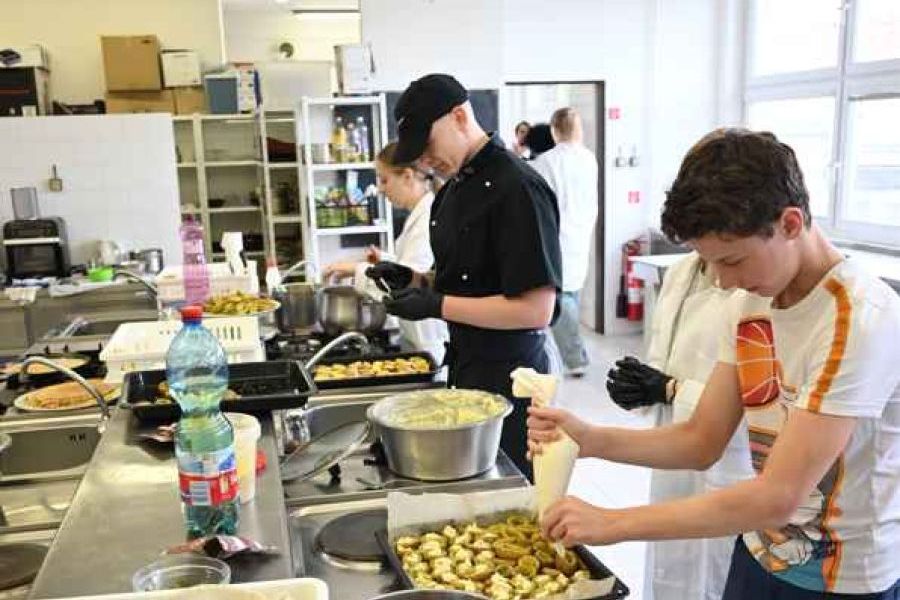
The problem
Pupils of the Ján Smrek Primary School with Kindergarten in Melčice-Lieskovo took part in peer learning at the Secondary Vocational School of Trade and Services at Jilemnického 24 in Trenčín. Climate change is a phenomenon of our time. It affects many countries and its cause is certainly linked to human activity that is not in line with the needs of our planet. It would be very difficult to find a person today who doubts its causes and consequences. These are felt by all of us in the form of extreme weather fluctuations, loss of biodiversity, deteriorating air quality, pollution of drinking water sources and rising ocean levels. At any time of the year, various media, environmental organisations and government representatives alert us to the global deterioration of living conditions on our planet. We are witnessing large-scale fires, floods and other natural disasters. Many believe that industrial production is the cause of these dramatic changes, but other parts of countries' economies also play a significant role. Scientists estimate that the Earth's population will exceed nine billion within the next twenty years. Producing enough food for such a huge number of people seems almost impossible. But the opposite is true. It is up to us how we meet this challenge.
Humanity is facing a crossroads. Will it choose the easier path - the path of non-organic and environmentally burdensome food production, processing and consumption; or will it choose the path of responsibly shaping a healthy and sustainable food system? These are complex ideas that give rise to wide-ranging considerations. However, we cannot ignore them and pretend that the world around us is fine and that nothing is happening to it.
The pupils of our school also have a critical perception of these issues. Therefore, we decided to take advantage of the offer that came to us. The students of gastronomy, in cooperation with the teachers, prepared a varied programme for us, in which they tried to highlight responsible and sustainable food production. We learnt a lot of necessary information about how we can also get involved in the process of change in our food system and about the possibilities of cooking with local ingredients. As our pupils come from a rural Slovak background, this topic is particularly close to their hearts.
As they themselves said, in many cases their families try to provide healthy food from local producers. Growing fruit and vegetables, rearing cattle, but also traditional honey and cheese production, all this is close to their hearts. Our pupils have also honed and learned practical skills that they can use to actively participate in improving the 'food cycle'. They gained valuable knowledge about the production of cottage cheese (tvaroh) and bryndza and under the guidance of the students of the Secondary School they had the opportunity to apply the acquired knowledge and skills in the preparation of various dishes.
The solution we used
The solution to the problem was to implement peer learning. The pupils of our school participated in activities prepared for them by the students of the catering department at the Secondary School of Education in Trencin in cooperation with their teachers. Pupils participated in cooking with local products and, so to speak, they could experience first-hand how such products taste and how they are produced. In the course of the programme, they learned a lot of useful information that they can pass on and influence, for example, their own family members. Under the guidance of culinary students, our pupils developed their cooking skills - in the preparation of lunch. They were also able to observe and actively participate in the production of cottage cheese from local ingredients.
Implementation
The Secondary Vocational School of Trade and Services in Trenčín approached us with an offer of cooperation. Since the pupils of our school consider the principles of sustainable food production and healthy lifestyle very important, they were very enthusiastic to take part in the project.
During Earth Day, 22.4.2024, we arrived with a group of eighth grade pupils at the Secondary School, Jilemnického 24 in Trenčín. We took part in a programme during which we gained valuable and important information about the food production process and the need to support local producers in the context of making appropriate and healthy food choices and sustainable development. After an initial introduction and welcome to the program, the students briefed us on the different sub-activities that had been prepared for our students.
Teachers from the secondary school introduced us to the process of making bryndza and cottage cheese. As one of the ideas of responsible food production is to support local producers in the sense of "farm to fork", the teachers presented us with the main advantages of such products as well as with the possibilities of their availability in the vicinity. Our pupils observed the production of cottage cheese from local ingredients, which was carried out by a teacher from the secondary school, who introduced us to the different technological procedures and steps. At the same time, she also introduced us to the health benefits that such local and natural products bring to the consumers. Under the guidance of the high school students, our pupils actively developed their cooking skills.
Pupils prepared pancakes, potatoes stuffed with bryndza or cottage cheese filling for pancakes. Our pupils appreciated the opportunity to actively participate in the cooking process with local ingredients and asked the older students various questions. The programme concluded with a lunch together, which consisted of self-prepared dishes. During the implementation of the program and the cooking of the meals, local ingredients were used from farms located nearby. The primary school pupils left the school enthusiastic and with a lot of new knowledge about the need to support local producers, who often produce their products in a traditional way from unhealthy ingredients. They understood that the health benefits of such food far outweigh those of food that is mass-produced without regard for its benefits to consumers.




